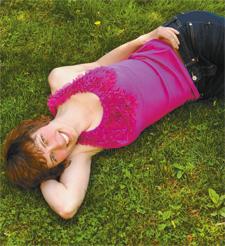Dinah Thorpe strides into the café as though propelled by the blustery wind on the Toronto street. She cuts a striking figure: six feet tall with light brown curls on a young, angular face.
She takes the stairs two at a time and smiles, sitting down with her tea.
Thorpe is a Toronto musician who has just released her debut album, Truths and Other Stories. Featuring the multi-instrumentalist on ukulele, guitar and piano, the two-disc album is part acoustic offering and part danceable electronica. At times heartrending and real, in other moments twisted and funny, Thorpe’s clear voice is the thread that ties together a range of styles, bold opinions and engaging beats.
With an appreciation for traditional ideas of art and the old-fashioned concept of an album, Truths and Other Stories is rounded off with artwork by Toronto anarchist artist Mike Parsons to match the themes of urban life and alienation. The title pays homage to Thomas King’s lecture series, “The Truth about Stories: A Native Narrative.”
“King speaks on what kinds of stories get told all the time,” she says, “and the kind of stories that need to be told. Similarly, I come to my work from a different place. My songs are about living in a city, being a dyke, how expensive it is to buy sperm, how I’m about to be hit by a car on my bike and how hard it is to create a sense of community, even when there’s two million people in this city. It’s about moving away from dominant narratives, colonial and post-colonial and what has been normalized, these things that come to be known as ‘truths’ and the kinds of stories that come to be known as ‘the other.’”
Thorpe’s songwriting is autobiographical. She lives with her partner and part-time with a step-daughter.
“Dykes have this amazing ability to build big beautiful families and rework the structure of their lives.” She laughs warmly. “Like for instance, my step-daughter has four moms.”
Naturally academic, Thorpe’s words become increasingly impassioned. She speaks about the Conservative government and popular conventions, but in her art this spills over into the storytelling of her songs, lending her a reputation as a political artist.
“It’s developed in a way that ‘being political’ is considered left. And being left is considered ‘being political.’ Driving a car and living a conventional life is certainly just as political. But it’s the queer spaces, the marginalized spaces… the spaces of opposition that are suddenly considered political because they oppose the norm.”
“Some people have the world view that matches the world around them,” she says, “and I think some fear that these crazy lesbian separatists are taking over the world. Like the opinions are the opposition and should be marked and watched closely.”
Thorpe laughs.
“So something political has come to occupy the space in my work, or at least that’s what it’s called. I do embrace that. But I put forth that everyone is political.”
Inevitably, Thorpe’s so-called politics affects the commercial aspect of her work, meaning mainstream radio-play and festivals may not feature prominently in her career. But the grounded, sexy voice and unapologetic representation of dyke life means she remains authentic — and loved.
“It really helps to never assume that your work will have commercial appeal. That assumption or acceptance allows for the freedom to create. I couldn’t create with the intention to write lyrics that would work for everyone. Sure, it would be nice to be commercially attractive because it would be nice to do this for a living, but… I think it’s more important to make art.”
“It’s not deliberate to live like this. To choose a life away from being image-driven. Nothing I do is image-driven. I just do what I actually like. If there is a deliberate choice, it’s to not censor myself.”
Thorpe leans back into her chair, her glass of tea emptied. With a mischievous, half-stern look in her eyes, she reminds me to listen closely to the album one more time.
“Are we done then?” She grins. We are.
With a nod and a grin, Thorpe’s jacket is on and she’s out the door. We may be done, but there’s the sense it’s only a brief reprieve.

 Why you can trust Xtra
Why you can trust Xtra


